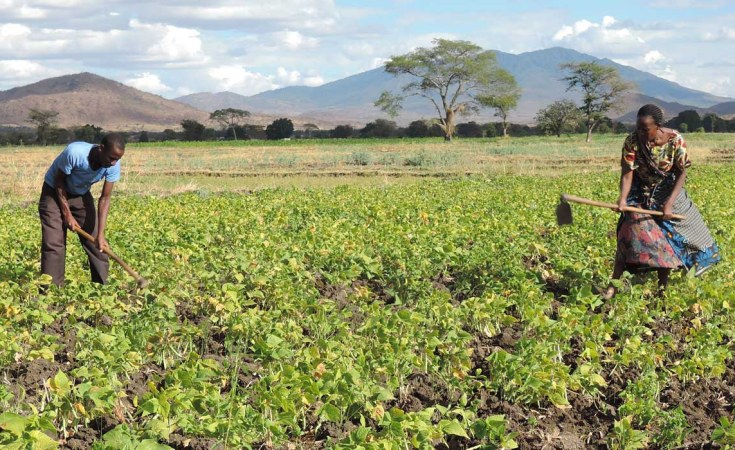ECONOMISTS have expressed optimism that the International Monetary Fund (IMF) 2.4tri/- loan to Tanzania will bring relief on cost of living.
The Executive Board of IMF on Monday approved 1.046.4 billion US dollars (about 2.4tri/-) Extended Credit Facility (ECF) to Tanzania.
The main purpose of the credit facility is to help Tanzania to cushion effects of the ongoing war between Russia and Ukraine, which has led to spiraling prices of oil and other commodities across the globe.
A cross-section of economists who spoke to 'Daily News' in exclusive telephone interviews were optimistic that the credit will offset rising prices of commodities in the local market.
They, as well, suggested that the fund should be used to provide subsidies on imported fertilisers, in order to reduce prices of the soil nutrient towards improved production of food crops locally to enable the country to become self-reliant.
An economist and former Executive Director of Economic and Social Research Foundation (ESRF), Dr Bohela Lunogelo, suggested that the funds should be used to ensure farmers access fertilisers at affordable cost.
"Russia and Ukraine supply Tanzania with a significant quantity of fertilisers but the ongoing war in those countries have led to increased prices of the commodity.
"What is more, Tanzania also imports substantial amounts of wheat from the two countries. As such, we have to empower local farmers to produce more food crops to ensure food security for our people," Dr Lunogelo explained.
He was highly positive that local farmers have the ability to produce food crops which are imported from Russia and Ukraine if they are provided with affordable fertilisers.
An economist-cum-investment banker, Dr Hildebrand Shayo, noted that the Russia-Ukraine war and sanctions imposed on the former have a significant impact on the Tanzania economy even as direct economic and trade links between Tanzania and the two countries are relatively small.
"The credit facility has come at the right time taking into account that Tanzania is not among 23 nations which have been categorised in a group of highest default risks as of 2022," he remarked.
Dr Shayo was of the view that if disbursed timely and used wisely, the credit could help to boost Tanzania, like any other nations impacted by the war, to temporarily manage its national plans and projects without putting too much pressure on local fiscals that largely rely on domestic revenue.
Dr Shayo applauded the sixth phase government under President Samia Suluhu Hassan for having attained the approval for the credit.
"As a nation, we have to be aware that whatever the medium- or long-term effects of the war, it is likely that firms and households around the world have to be fearful that the worse-case scenario would not only affect investment and consumption decisions but will hold back the wider recovery effort.
"It is important to remember as part of the world trade system, we are not out of the woods yet. Commodity prices are on increase and imported inflation could force us to take more measures," he advised.
A senior lecturer of economics at the University of Dar es Salaam, Prof Humphrey Moshi, emphasized on the need to put more focus on local production of food crops to offset high prices in the world market.
"It is high time we became self-reliant on food production. This will enable us to cushion the country against volatility of prices," the academician recommended. On the other hand, Prof Moshi hailed the government for granting 100bn/- each month as a subsidy to counterbalance increasing prices of fuel.
"It should be noted for instance that diesel is used by commercial vehicles and machineries and thus high prices of fuel is like an influenza since it spreads its effects to all sectors of the economy," he stated.
The don, however, expressed concerns that globalisation shares a portion of blame on increasing prices of commodities since local farmers have been reluctant to increase production on some food crops such as wheat since the commodity could be sourced from other countries.
Presenting budget estimates for fiscal year 2022/2023 in June, this year in the National Assembly, Finance and Planning Minister Mwigulu Nchemba outlined a number of measures aimed at cutting expenditures.
The cost-cutting measures by the government of Tanzania come at the time when the world is faced with increasing prices of commodities and also healing from effects of the Covid-19 pandemic.
According to a press statement released by the IMF on Monday, the 40-month (200 per cent of quota) financing package to Tanzania will also help preserve macroeconomic stability.
It will as well support structural reforms toward sustainable and inclusive growth, drawing on the government's priorities.
The ECF arrangement follows the IMF's emergency support to Tanzania last year of 561.5 million US dollars (about 1.3tri/-) through Rapid Credit Facility to help the country navigate through the effects of Covid-19 pandemic.
According to the IMF statement, spillovers from the war in Ukraine are stalling the Tanzanian economy's gradual recovery from the Covid-19 pandemic, exacerbating the country's development and reform challenges to unleash its economic potential.


